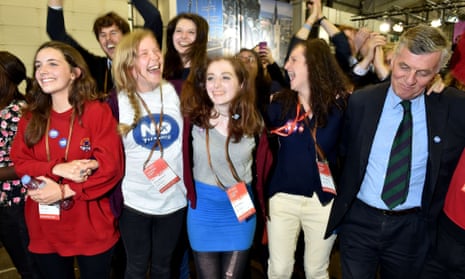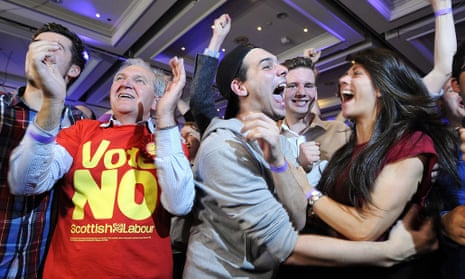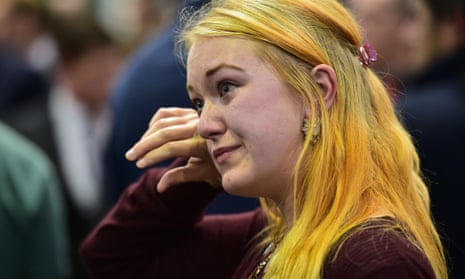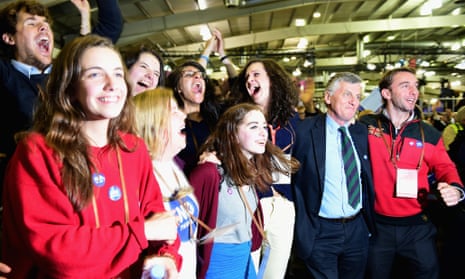Here are some of the key pictures that sum up a night of raw emotion on both sides of the campaign.






We’re wrapping up this live blog now, but our live coverage of the result of the Scottish independence referendum will continue here.
Rolling coverage of the results of the Scottish independence referendum, with reaction and analysis as Scotland pulls back from leaving the United Kingdom
Here are some of the key pictures that sum up a night of raw emotion on both sides of the campaign.






We’re wrapping up this live blog now, but our live coverage of the result of the Scottish independence referendum will continue here.
Whatever else we can say about this referendum campaign, we have touched sections of the community who have never before been touched by politics, these sections of the community have touched us and touched the political process. don’t think that will ever be allowed to go back to business as usual in politics again.
We’ll be launching a new blog very, very soon to cover all the developments on Friday, including reaction to the result and Cameron’s initiative, and Salmond’s press conference. I’ll post the link here as soon as it’s up.
Thanks for reading. AS
Ewen MacAskill has been looking more closely at the details of Salmond’s speech and deciphering what he meant in the key passages. He writes:
He accepted Scotland has not “at this stage” decided to vote for independence.
Salmond has repeatedly said the referendum was a once in a generation opportunity and he did not envisage a re-run for another couple of decades. But “at this stage” leaves open the prospect of an earlier one if, for instance, the main UK parties were to renege on their promises of more devolution by next year.
Salmond has always been a gradualist, preferring to build up devolved government to the point that he judges Scotland would be ready for independence. He did not want the referendum now but next time he might judge the time is ready.
That the new devolved powers must not only be implemented but implemented quickly, by early next year. “Scotland will expect these to be honoured in rapid course,” the first minister said.
The danger is that Conservative backbenchers might look at the result and decide David Cameron made a mistake in offering the extra powers. They could use delaying tactics or even mount a rebellion against the legislation. That would be a fantastic opportunity for Salmond to exploit.
He could then fight the general election next year and the Scottish parliamentary election in 2016 on a mandate for another referendum.
“We have touched sections of the community who have never before been touched by politics.”
Salmond was putting a spin on a defeat. But he had a point. The independence campaign, led by the SNP, mobilised and enthused a huge chunk of the electorate who had never voted before or had little time for political life. He has lifted support for independence from around 30-35% to around 45%. Independence is no longer unthinkable.
This from our political correspondent Nicholas Watt on the position Cameron is left in:
David Cameron has just survived a brush with political death. Like Margaret Thatcher after the invasion of the Falklands in 1982 and Tony Blair on the eve of the Iraq war vote in 2003, Cameron knew that his premiership was in peril over the Scottish referendum.
The rejection of independence means the prime minister survives. But he now has to negotiate his way round a series of minefields to ensure that the SNP cannot push for an early re-run of the referendum and to reassure Tories who are alarmed that plans to devolve more powers to the Scottish parliament will place English MPs at a disadvantage.
Cameron concludes saying it is time to move forward to a better future.
He welcomes the fact that Britain is a country where these matters can be resolved peacefully, at the ballot box.
Cameron says he has delivered on devolution in this parliament. And the three UK parties will take it forward in the next parliament.
Lord Smith of Kelvin, who oversaw the Commonwealth Games in Glasgow, will oversee this process too. There will be agreement by November, and draft legislation by January.
But England needs a fair solution too. The West Lothian question (why should Scottish MP vote on English matters when English Mps can’t vote on Scottish ones?) needs an answer.
William Hague will set up a cabinet committee on this. He hopes the other parties will contribute.
He also wants to give more power to cities. He will say more about this in coming days.
He says he is delighted the people of Scotland have voted to keep the UK together.
That sentiment is shared by people, not just in this country, around the world.
Now it is time to move forward. There must be a “balanced settlement”, fair to the people of Scotland, but of the rest of the UK too.
Cameron says he wanted a referendum. It is best to confront big decisions, not duck them.
And it was right to ask the question.
But the matter has been settled now for a generation. Or, as Salmond once said, “for a lifetime”.
He says he has a message for those who voted for independence: “We hear you.”
David Cameron is about to make a statement outside Number 10.
David Cameron, who is expected to speak shortly, has just tweeted this:
I've just spoken to Alex Salmond, congratulating him on a hard-fought campaign. I'm delighted the SNP will join talks on further devolution.
— David Cameron (@David_Cameron) September 19, 2014
Salmond’s concession speech – Snap verdict: It was a gracious concession speech. The British don’t like a bad loser. (Or is it just the English who don’t? All this talk about national characteristics, and I’m getting confused.) Alex Salmond did not blame anyone, he did not sound bitter, he promised to accept the result and he urged everyone else in Scotland to do likewise. It was all very grown-up and proper.
And then – it was pretty much it back to normal. You might have expected him to spend the evening thinking whether he should resign, but he did not address that issue at all, and in fact he sounded as it was the last thing on his mind. He celebrated the turnout as “a triumph for the democratic process and for participation in politics” and then – rightly, I think – he said that the Scottish government’s decision to give 16 and 17-year-olds the right to vote in this election would mean, in practice, they would be voting in Scottish elections for ever more.
I suspect that no one will ever again dispute their right and ability to participate fully and responsibly in democratic politics.
But the highlight was what he said about the next referendum. On Sunday last week he told Andrew Marr that this would settle the matter for a generation (although, if you studied his words closely, it was clear that he envisaged a second referendum taking place reasonably soon under another leader). Today he dropped a very heavy hint that this is exactly what he expects to happen. (My italics.)
Scotland has by a majority decided not, at this stage, to become an independent country.
He said that he would focus on forcing London to deliver on its promise of more power for Scotland. David Cameron is about to speak shortly. But Salmond said that he would “reflect” on Cameron’s comments and tell us what he thinks at a press conference later.
Salmond has made a career out of picking a fight with Westminster. This morning he sounded as if he was just getting back to business as usual.
Tom Clark gives his three lessons from the night:
He says he and his colleagues will play their part in bringing Scotland together.
It has not been easy. Campaigning against change can be difficult. They had to campaign negatively. It was a sign of the “good sense” of the Scottish people that they decided this was too risky.
But the vote is over. People want change.
Come on Scotland. Let’s get over it together.
Alistair Darling is speaking now.
He says the people of Scotland have chosen unity over division.
They have reaffirmed the bonds that tie them to the English. Let them never be broken, he says.
He thanks all his team.
Salmond says people were inspired to get involved in this campaign.
All of us have been a part of that, he says.
It is a campaign that has “touched sections of the community than have never before been touched by politics”, he says.
There should be no return to what was there before, he says.
He says he did not think so many people could vote for independence when he entered politics.
The fear was felt by the Westminster establishment, as they realised the mass movement against them.
We shall go forward as one nation, he says.
Salmond says the turnout of 86% has been a triumph for democratic politics.
And letting 16 and 17-year-olds vote has been a triumph, he says. No one will every again dispute their right to take part in elections.
He says, in accordance with clause 30 of the Edinburgh agreement, he will accept the result and work with London in the best interests of Scotland and the rest of the UK.
The unionist parties made promise, he says. They promised the second reading of a Scotland bill by 27 March. The Scots will expect that promise to be honoured, he says.
Alex Salmond, Scotland’s first minister, is speaking now.
He thanks Scotland for 1.6m votes for independence.
There will be a majority for no, he says.
The referendum was an agreed process.
Scotland has decided “at this stage” not to become an independent country.
He accepts that, he says. And he calls on all people in Scotland to accept that too.
Comments (…)
Sign in or create your Guardian account to join the discussion